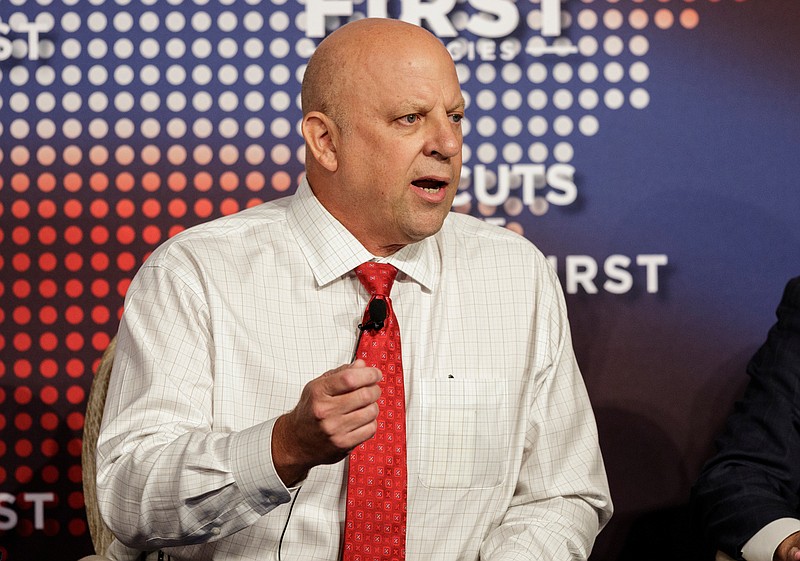U.S. Rep. Scott DesJarlais, R-Winchester, who represents all the counties that surround Hamilton County, is one of more than 60 Republican House signatories on a recent letter to the U.S. Department of Justice asking why the department appears to be targeting parents who oppose "hot-button social issues" being taught in public schools and what safety protocols their children are to follow in schools.
The letter made specific reference to a memo by U.S. Attorney General Merrick Garland, who wrote on Oct. 4 that it is his intention to offer "a series of measures to address the rise in criminal conduct directed toward school personnel."
His memo was in response to a National School Boards Association letter that claimed parental opposition to mandates and various ideologies taught in the school "could be the equivalent to a form of domestic terrorism and hate crimes."
The school board association letter and the attorney general's response have created a firestorm across the country from parents who believe they have every right to offer their opinions on the education of their child and the relative classroom safety of their child to their local school board.
The letter to Garland asks that he respond to the following questions by Nov. 15:
1. What specific cases are you referencing in your memorandum that rise to the level of "criminal conduct?"
2. What criteria/behavior is the Department of Justice considering "criminal conduct?"
3. What federal statutes do you plan to cite in your prosecution of these parents?
4. Who will be conducting the investigation into these cases? Please provide details on the roles of the FBI, United States Attorneys, State and local law enforcement, and any other entities that will be involved.
5. Will you be looking into other cases of alleged intimidation of school board members who have attempted to end COVID-era policies?
The letter states: "While we agree with you that any threat of violence against these government officials should be condemned and investigated, no government official has the right to claim that a citizen may not peacefully speak out against government policies."
The letter also refers to the public statement by former Virginia Gov. Terry McAuliffe (and current candidate for the job), who said, "I don't think parents should be telling schools what they should teach."
In the letter's conclusion, it adds: "As the top law enforcement officer in the United States, it is your responsibility to combat criminal behavior as well as defend the constitutional rights of all Americans."
DesJarlais was the only House signatory from Tennessee. Among the other signatories were Rep. Madison Cawthorn, whose North Carolina district borders eastern Tennessee; Rep. Mo Brooks, a congressman whose northern Alabama district borders Tennessee; and Elise Stefanik of New York, the third-ranking GOP member of the House.
Since school began in August, some parents in Tennessee, Alabama, Mississippi, Florida, Oklahoma, Utah and California, among other states, have argued with school board members about mask and vaccine mandates.
We would never condone violence - which the letter reiterates - but we feel parents must be able to make their voices known about their children's schools and their safety. They may have a misunderstanding - imagine that with all the alternate facts propagated on social media - or they may just disagree with a policy and want to be heard.
Tucker McClendon, a member of the Hamilton County Board of Education representing East Brainerd and East Ridge, agreed.
"Parents are our customers," he wrote in an email, "and I will always support their input and attendance at our meetings. Differences of opinion can run deep, but the board will always hear both sides and then do what we believe is the right thing for students in Hamilton County."
Too often today, public officials, organizations, and colleges and universities don't want to hear opposition to their preconceived notions. They're right, and you're wrong. End of discussion. But that is diametrically opposite to the way in which this country became the world's most powerful beacon of freedom.
We don't want - and we don't believe you want - to see decisions surrounding public education and the safety of children within public education spaces be made without the opportunity to agree with them, oppose them, ask about them or comment on them, if you so choose.
Letters like the one DesJarlais signed are frequently sent by members of Congress to administration representatives (of both parties) and never get an answer. They mean what they say, but they're sent mainly to show the public the members are taking action.
In this case, we hope they hear back from Garland because these memos have awakened a group of parents who aren't ready to sacrifice their children's education on an altar of silence.
